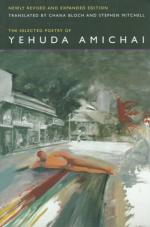|
This section contains 3,987 words (approx. 14 pages at 300 words per page) |

|
SOURCE: "Reading Amichai Reading," in Judaism, Vol. 45, No. 179, Summer 1996, pp. 311-23.
In the following essay, Kronfeld explores the ways in which Amichai retains accessibility while also using complex intertextuality in his poetry.
Yehuda Amichai is the most distinguished Hebrew poet of our time and an internationally prominent literary figure. His poetry is part of the literature curriculum that new generations of readers are raised on, from Israeli school children to college and graduate students in Israel and the United States. His work is the subject of academic conferences and increasingly—though still insufficiently—of serious scholarship. In the hands of any other poet this poetry's steady diet of allusions, parodic midrashim, pseudo-commentary, and other forms of intertextuality would result in a dauntingly difficult body of work. Yet Amichai continues to be a phenomenally popular poet, accepted and admired as the crafter of the "easy poem."
In this essay...
|
This section contains 3,987 words (approx. 14 pages at 300 words per page) |

|


